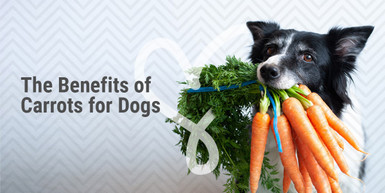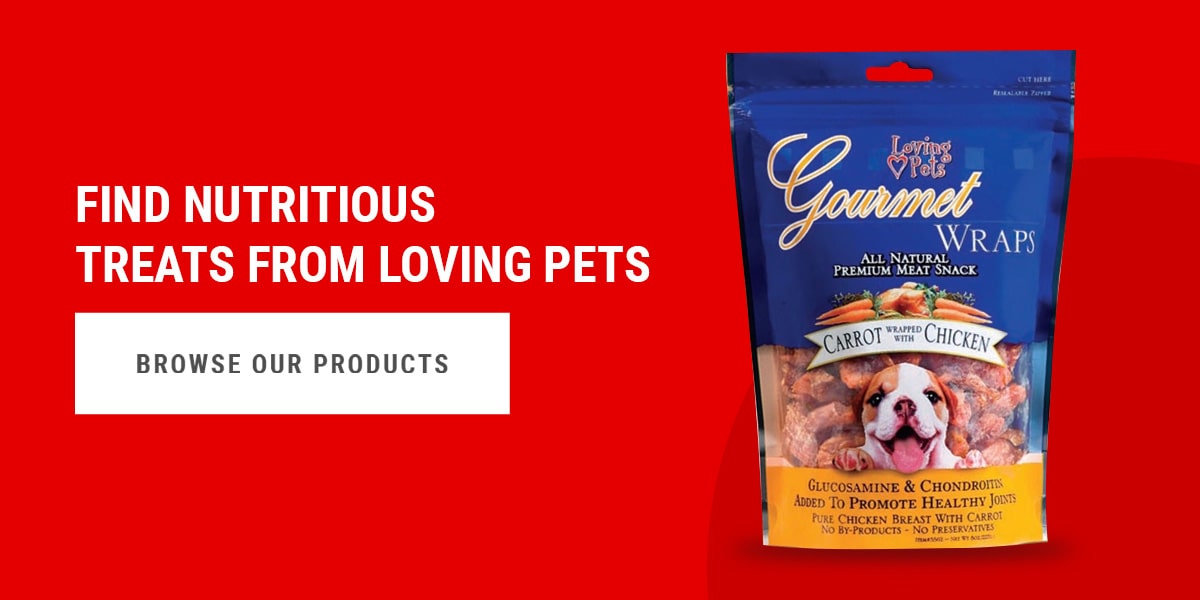The Benefits of Carrots for Dogs
When you think of dog treats, you likely don't think of vegetables as a tasty treat they'll enjoy. But some, like carrots, offer incredible health benefits, and your pup might love them. Whether you're out of treats or want to find ways to support your pup's health, you can reach for carrots as an alternative that can provide tons of nutritious benefits.
Keep reading to discover the benefits of carrots and how you can add them to your dog's diet.
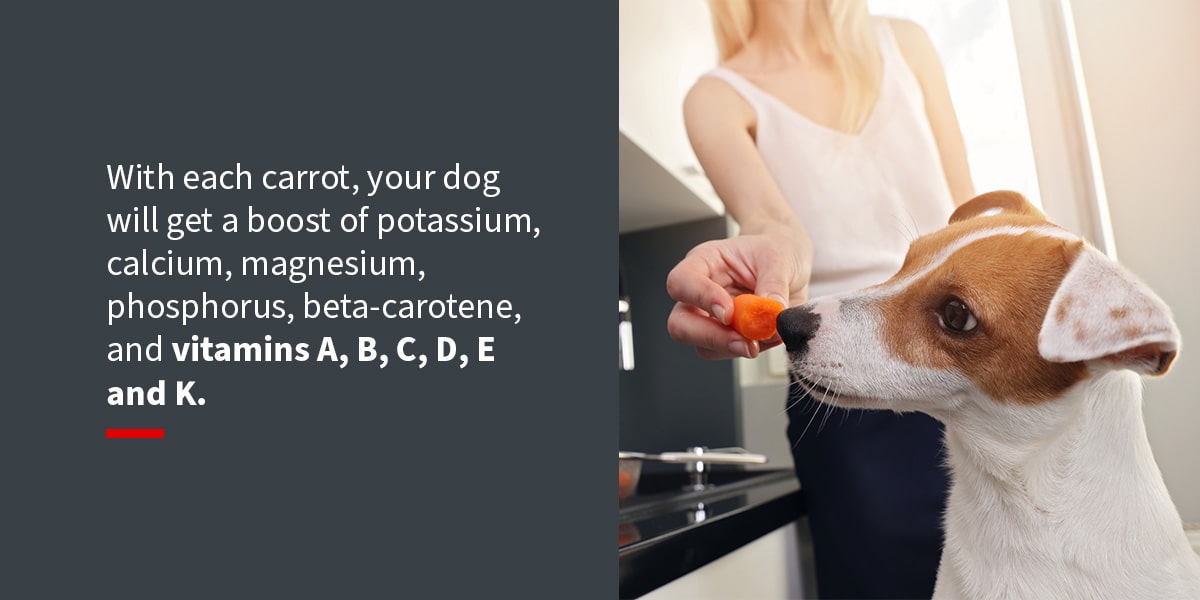
Can Dogs Eat Carrots?
Many people understand the health benefits of carrots for humans but haven't considered whether their pets can enjoy them, too. With a satisfying crunch, vitamins and fiber, carrots are a tasty and healthy snack for dogs.
With each carrot, your dog will get a boost of potassium, calcium, magnesium, phosphorus, beta-carotene, and vitamins A, B, C, D, E and K. This vegetable is also full of other phytonutrients that can protect their eyes from the sun.
As you read our guide to carrots for dogs, you'll discover additional benefits of this vegetable for your pup and how you can incorporate this vegetable into their diet.
Top Benefits of Feeding Your Dog Carrots
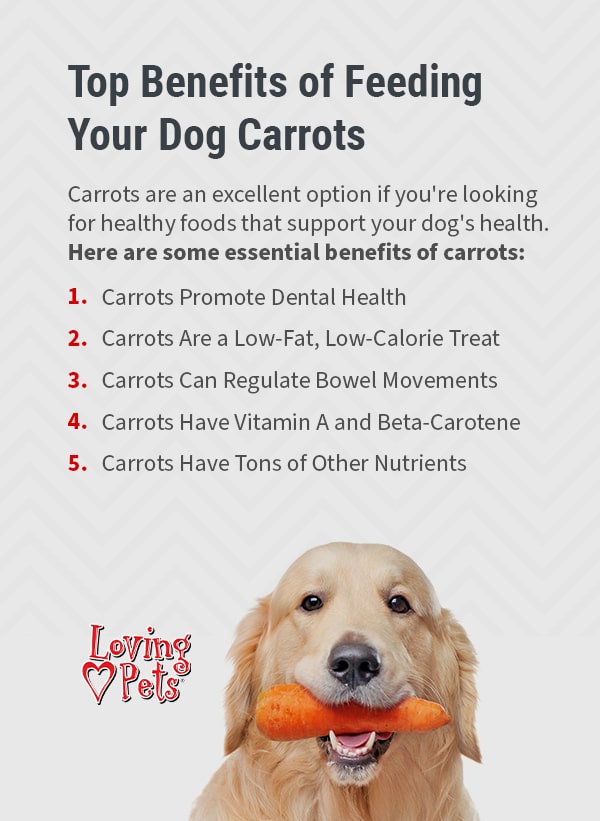
On top of supporting dental health and supplying tons of vitamins and nutrients, carrots are a low-calorie alternative to the dog treats you can find at the store. Carrots are an excellent option if you're looking for healthy foods that support your dog's health. Here are some essential benefits of carrots:
1. Carrots Promote Dental Health
One of the biggest challenges dog owners face is keeping their pups' teeth clean. Many dog owners incorporate canine dental practices early, and their dogs grow to tolerate teeth brushing.
However, some dogs dislike teeth brushing, and owners can forget to make it a routine. Neglecting this can lead to significant plaque buildup that affects your dog's health. Thankfully, carrots are an excellent way to support dental health between brushes.
After a professional cleaning to remove plaque, you can use tough chews to prevent future buildup. Similar to bones and toys, carrots can prevent plaque from forming while providing additional vitamins and nutrients. You can freeze carrots and encourage your dog to chew away. Each bite will massage your dog's gums and scrape their teeth, giving them a daily, gentle cleaning.
2. Carrots Are a Low-Fat, Low-Calorie Treat
Carrots are excellent snacks for pups who need dietary care. Rather than overfeeding your dog, you can provide carrots between feeds for a low-calorie and low-fat snack. Every 100 grams of raw carrots has about 40 calories and 0.2 grams of fat.
Whether your dog is diabetic or needs to shed a few pounds, carrots are a healthy treat they can snack on. Opting for carrots in place of other unhealthier treats can be an easy way to provide a big health boost for your dog.
3. Carrots Can Regulate Bowel Movements
This vegetable has high amounts of soluble fiber, supporting regular and healthy digestion. Fiber softens stool while increasing stool weight and size. Larger stools are easier to pass, decreasing the chances of constipation. High-fiber diets can reduce the chances of having hemorrhoids and possibly prevent colon diseases.
One 1/2 cup of whole baby carrots offers 2.1 grams of fiber, and 3 ounces provide 2.5 grams of fiber. If you're beginning to add carrots to your dog's diet, you should ensure they have plenty of water to drink and add only small amounts to ensure the fiber can move seamlessly through their bodies.
4. Carrots Have Vitamin A and Beta-Carotene
Vitamins are essential for proper health in humans and animals. Carrots are rich in vitamin A and beta-carotene, which have immense benefits.
Vitamin A supports eye health and the immune system. It can also give your canine healthy skin and a healthy coat. Many commercially produced dog foods have vitamin A, so your pup likely already gets a beneficial amount of this nutrient.
This means if you're looking to switch to new food brands or need to fill your dog's bowl before you can make it to the store for a new bag, carrots are the perfect substitution. However, be sure you're not overfeeding vitamin A, as this could result in a toxic body buildup. Speak with your vet to determine the proper amount of vitamin A for your dog before changing their dietary routine.
Carrots also contain beta-carotene, an antioxidant that helps maintain good vision. The saying that carrots can help you see better holds some weight, as beta-carotene is an essential precursor to vitamin A. This nutrient helps prevent infections and disease, keeping your pup on their feet longer. It also supports good reproductive health, prevents cancer and ensures normal bone development, helping your puppy live their best life.
5. Carrots Have Tons of Other Nutrients
The nutritional value of carrots spans beyond Vitamin A and beta-carotene. This vegetable contains many other vitamins and minerals to support your dog's health. Carrots consist of the following:
- Vitamin K: This vitamin is essential for many people and animals. It can prevent heart disease and ensure calcium doesn't remain in the arteries, which can lead to plaque buildup. More importantly, vitamin K allows blood to clot, a necessary function that enables us to overcome injuries and heal. Although many dogs can form vitamin K within their bodies, some pups have conditions that prevent this, making it essential that you deliver the necessary amount to your canine to keep them healthy.
- Potassium: Potassium is a critical mineral that aids in your pup's heart, muscle and nerve electrical charge functions. When dogs are deficient in potassium, they tend to be tired, lack appetite, or lose weight and muscle. Providing the proper amount of potassium is critical to their daily functions and will support them throughout life.
- Vitamin B6: This essential vitamin helps to synthesize neurotransmitters like serotonin and dopamine. Vitamin B6 is critical for ensuring these neurotransmitters go where they need to and start and stop at appropriate times. With a deficiency of this vitamin, your dog's immune system may become compromised.
- Calcium: Calcium delivers similar benefits to pups as it does for humans. Calcium supports proper growth and development and promotes healthy teeth and bones. It's also critical for the nervous system and heart health while ensuring proper muscle function and building.
- Iron: This mineral carries oxygen to blood cells and ensures the proper function of many enzymes. Without iron, your pup couldn't produce energy, leading them to become weak, disease-prone and lethargic. If your dog is deficient in iron, carrots are an excellent natural source to help raise their levels.
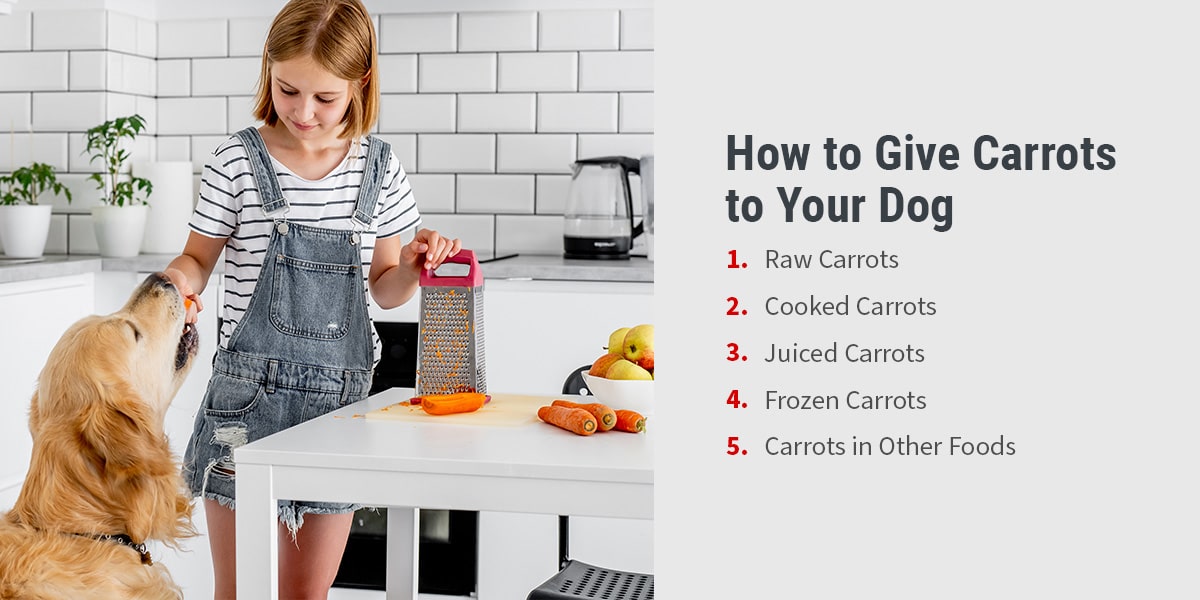
How to Give Carrots to Your Dog
Introducing carrots into your dog's diet can be simple. Dogs can enjoy carrots in many forms, giving you the flexibility to serve them in the most convenient way for you. Speak with your vet to determine how many carrots your pup should have daily and what form may be most beneficial.
Always wash the carrots thoroughly before feeding any to your canine. For basic ideas about incorporating carrots into your dog's diet, check out the following tips.
1. Raw Carrots
Raw carrots are an excellent way to encourage your dog to enjoy a healthy treat. Be sure to measure your servings and only provide the amount they need. Cut them into manageable pieces to avoid choking hazards.
You can place the carrot pieces directly in your dog's food bowl with their other meals or put out fresh pieces throughout the day when your pup wants a snack. You can also add carrots as a topping by grating carrot pieces over their meals.
2. Cooked Carrots
Although some vegetables offer the most benefits in their raw form, carrots are best when you cook them. You and your pup will have an easier time absorbing the minerals and nutrients in this vegetable when you cook them to break down the carrots' cell walls.
Roasting, sautéing or steaming are better options than boiling. However, if your dog prefers boiled carrots, you can maximize the benefits by boiling them whole rather than in chunks.
3. Juiced Carrots
Carrot juice is an incredible source of vitamin A. However, juicing carrots can cause them to lose their dietary fiber. Add the carrot pulp into the mix after juicing if you want to incorporate more fiber. If your dog doesn't need additional fiber in their diet, skip this step.
For a delightful snack you can enjoy together, juice your carrot peels. When you're getting ready to enjoy some carrots, peel the vegetables and juice everything you take off. Give the carrot juice to your pup, and you get to eat the carrots.
4. Frozen Carrots
You shouldn't attempt to feed whole frozen carrots to your pup, though you can use them as tough chews for their dental health. Frozen carrots can create a choking hazard if your dog bites a large piece. However, if you keep a watchful eye and take the carrot away after a few minutes, you can use frozen carrots to benefit your pup's teeth.
If you're concerned about your pup eating pieces larger than they should, you can freeze the carrots to make ice cubes. Grate the carrots and blend them into juice. Fill an ice cube tray with carrot juice and take one out when your pup wants a cool treat. This way, they can enjoy the benefits of carrots safely.
5. Carrots in Other Foods
You may need to get creative with carrots if your pup isn't a big fan of them. Fortunately, there are tons of treats and meals you can make with carrots to ensure your dog experiences their benefits.
You can add carrot pieces to your dog's favorite baked goods or meals. For example, if your pup loves eggs, you can make an omelet with grated carrots. Another idea is peanut butter balls with shredded carrots.
One of the simplest ways to add carrots to your dog's diet may be to find pre-made carrot treats. For meat-loving canines, these chicken-wrapped carrot treats are an excellent choice. These bites have tons of flavor and nutrition, making them a great treat for even picky dogs.
Whether you're making or buying dog treats, avoid items with too much sugar. Foods like carrot cake contain a lot of sugar and can cause an upset stomach in your pup. Additionally, some dessert ingredients like chocolate, nutmeg or birch sugar can be toxic for canines.
How Many Carrots Can Dogs Have?
Although carrots are an excellent treat, too much of anything can become a bad thing. It's best to speak with your vet for advice about your dog's dietary needs, as small and large dogs have different needs, and pups with health conditions need more specialized nutritional attention.
Here, we've outlined how many carrots you can typically serve your pup safely:
- Extra small dogs: Pup breeds like pugs, yorkies, shih tzus and pomeranians can enjoy one or two carrot sticks about 1/4 inch thick.
- Small dogs: Breeds like beagles and basenjins can consume two or three carrot sticks about 1/4 inch thick.
- Medium dogs: Canine breeds like Siberian huskies, bassett hounds and border collies can eat five to six carrot sticks about 1/4 inch thick.
- Large dogs: You can feed about a small handful of 1/4 inch carrot sticks or bites to breeds like labrador retrievers, German shepards, Australian shepards and pit bulls.
- Extra large dogs: A large handful of carrot bites or slices about 1/4 inch thick is suitable for dogs like Newfoundlands, St. Bernards and Great Pyrenees.
Find Nutritious Treats From Loving Pets
Loving Pets prioritizes high-quality and affordable treats for your pets. We craft our products with real meat and simple ingredients, so you always know what's going in your dog's food and can trust you're giving them the healthiest options. All of our products are made in the USA!
Browse our dog treats to find tasty and healthy foods that will support your pup and provide the nutrients they need to thrive.

